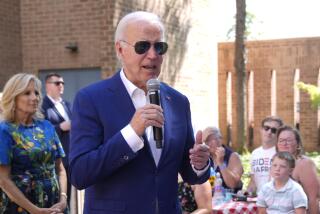Mayors Get Bad and Good News From Gingrich; Clinton Pitches His Plans : Cities: The Speaker is hailed on the ‘unfunded mandates’ actions. But his policy proposals are seen as power shift to states, blows to urban programs.
- Share via
WASHINGTON — The nation’s mayors had their first audience Friday with Rep. Newt Gingrich (R-Ga.) since he became House Speaker--and many of them did not like what they heard.
Gingrich promised the mayors a “new partnership” in which they would have more control over local programs and less “stupid and expensive” interference from Washington.
The Speaker, addressing the U.S. Conference of Mayors, a group of predominantly Democratic big-city chief executives, said that the GOP-led Congress would burden them with far fewer costly demands on everything from welfare rules to sewage treatment plants.
The Speaker urged the mayors to contact him or his lieutenants and report examples of the federal government’s “incredibly incompetent and inept behavior and often arrogant and destructive behavior. And let’s identify the worst cases and get rid of them and move on.”
The mayors applauded when Gingrich noted that the Senate on Friday passed a bill outlawing “unfunded mandates” on cities and states and pledged that the House would quickly approve the measure.
But the mayors took Gingrich’s urban policy proposals as a barely disguised plan to radically cut urban programs and shift power from Washington to state capitals, many of which are now in the hands of Republicans who share Gingrich’s appetite for cutting social welfare programs that are important to many big cities.
*
While Gingrich was politely received by the group, there was deep skepticism among the city leaders, many of whom rose through urban Democratic politics and have long enjoyed the patronage of powerful Democratic committee chairmen in Congress.
“His system is filled with contradictions,” said Mayor Paul Soglin of Madison, Wis.
President Clinton, addressing the group later in the day, delivered a pitch for his “middle-class bill of rights” and asked the mayors to support his proposal to raise the minimum wage.
He noted, almost in passing, that he was planning a major consolidation of programs in the Department of Housing and Urban Development that would result in cities getting far fewer federal dollars for public housing. The money instead would be given directly to tenants of public housing projects to use for rent wherever they chose to live.
“I want to emphasize that we’re doing this to strengthen the mission of HUD and to strengthen the partnership that we have with the cities of this country, not to gut the department’s partnership or its capacity to help you do your job,” Clinton said.
*
He did not mention that he intends to propose an $800-million reduction in HUD’s budget over the next five years to pay for his middle-class tax cut, which is targeted more at suburbanites and residents of small and medium-sized cities.
Vice President Al Gore told the mayors’ conference that the Clinton Administration would soon propose an urban partnership program of its own, dubbed “performance partnerships.” He said it would consolidate a number of existing programs into broad grants with few strings attached and bonuses for success.
“It merges funding categories, creates funding incentives which reward risk-taking and reaching desired results, and reduces micro-management and paperwork,” Gore said.
A number of the mayors expressed concern that Washington, in its zeal to give up federal power, would bypass the cities and deal directly with state governors. Most of the ideas that are now being debated to reform the health and welfare systems were designed and tested in state capitals.
“No matter what passes here, it’s only going to be as effective as our ability to do it in our cities and on our streets,” said Denver Mayor Wellington Webb.
More to Read
Get the L.A. Times Politics newsletter
Deeply reported insights into legislation, politics and policy from Sacramento, Washington and beyond. In your inbox twice per week.
You may occasionally receive promotional content from the Los Angeles Times.









